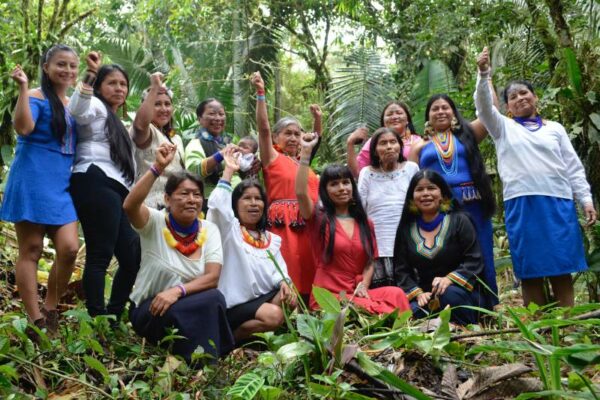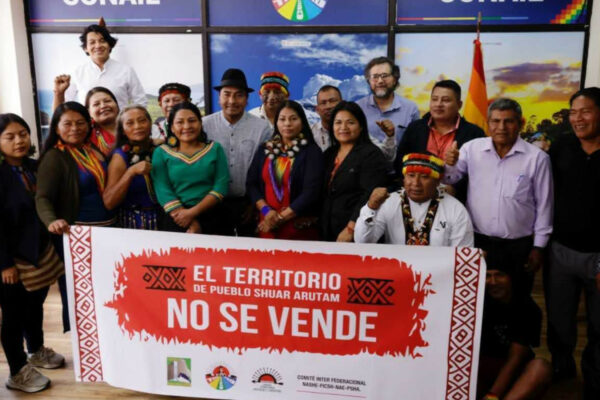Environmental activists in Ecuador are claiming a tentative victory in their long fight to prevent the construction of an oil pipeline through one of the world’s most pristine bird sanctuaries, the Mindo Namibillo Cloudforest Reserve, high in the Andean mountains in the country’s Amazon region.
Published reports from Ecuador Wednesday said the Oleoducto de Crudo Pesado (OCP, or Crude Oil Pipeline) was suspending its construction work in the reserve until the end of rainy season in April.
The reports come amid escalating protests by dozens of local residents, students, and environmentalists who have been gathering in the reserve as OCP’s road-building and construction crews have approached the site over the past week.
California-based Amazon Watch issued warnings over a possible Ecuadorian police clampdown on the demonstrators ahead of a scheduled hearing January 14 on the project in the parliament of the state of North Rhine Westphalia in Duesseldorf, Germany. The state holds a 43 percent interest in Westdeutsche Landesbank (WestLB), a leading member of the consortium of banks providing US$900 million for the project.
Amazon Watch has been spearheading a campaign involving more than 30 Ecuadorian and international nongovernmental organizations (NGOs) which called on WestLB to suspend loan pay-outs pending a full review of whether the project conforms to World Bank environmental policies.
“It is obvious that the OCP consortium did not want bulldozers battling tree-sitters at the very moment when the company’s US$900 million loan is in jeopardy in Germany,” said Yvonne Ramos of Accion Ecologica, an Ecuador-based environmental group.
“This is a significant factor in OCP’s announcement that construction is being suspended in Mindo,” she added.
The proposed pipeline – which, on completion, will stretch 300 miles from the Ecuadorian Amazon to the Pacific Ocean, passing through several indigenous territories and ecologically fragile protected areas – has provoked controversy virtually from its conception.
While the government of President Gustavo Noboa has defended the US$1 billion project as essential to jump-start Ecuador’s troubled economy, critics have argued that the costs to indigenous cultures and unique ecologies will be too great.
Pipeline spills would risk despoiling potential eco-tourism spots, and the construction of the pipeline itself will likely draw settlers who may clash with indigenous groups and exert unsustainable pressure on fragile rainforest ecologies, according to opponents of the plan.
The production of oil, Ecuador’s most lucrative export by far, has lagged in recent years, but could double once the crude begins flowing through the OCP to ports on the Pacific coast.
The pipeline has already set off a major boom in new oil investments in Ecuador, with some US$2.5 billion over the next five years to be channeled into oil exploration, drilling, feeder pipelines, refineries, and related facilities, according to Amazon Watch.
Since September, protesters have repeatedly hampered construction by blocking roads and committing other acts of civil disobedience. In the past week, activists have built tree-top stages for “sit-ins” aimed at obstructing the path of a proposed road.
Critics will also feature among those providing testimony at next week’s Westphalia hearing on the project. Green Party members in the parliament, and even the state’s environment minister, Baebel Hoehn, have spoken out against WestLB’s participation.
WestLB has insisted that it views the OCP’s adherence to strict environmental standards to be a “precondition” for its support of the project. On December 14, it noted that four sets of consultants approved the project and that it has also established an independent team of environmental representatives, including an official of BirdLife International, one of the world’s largest bird protection NGOs, to monitor implementation.
“WestLB takes seriously the currently expressed concerns about the environmental compatibility of the project and continues to view it as a precondition that the project sponsors carry out the project…in accordance with the agreed environmental standards,” said the bank.
It also pledged to “exert its influence” to ensure that OCP “remains available for talks with all interested parties.”
A report commissioned by Amazon Watch and written by a former representative of the World Wildlife Fund in Bolivia found that the project violated seven World Bank environmental policies.













